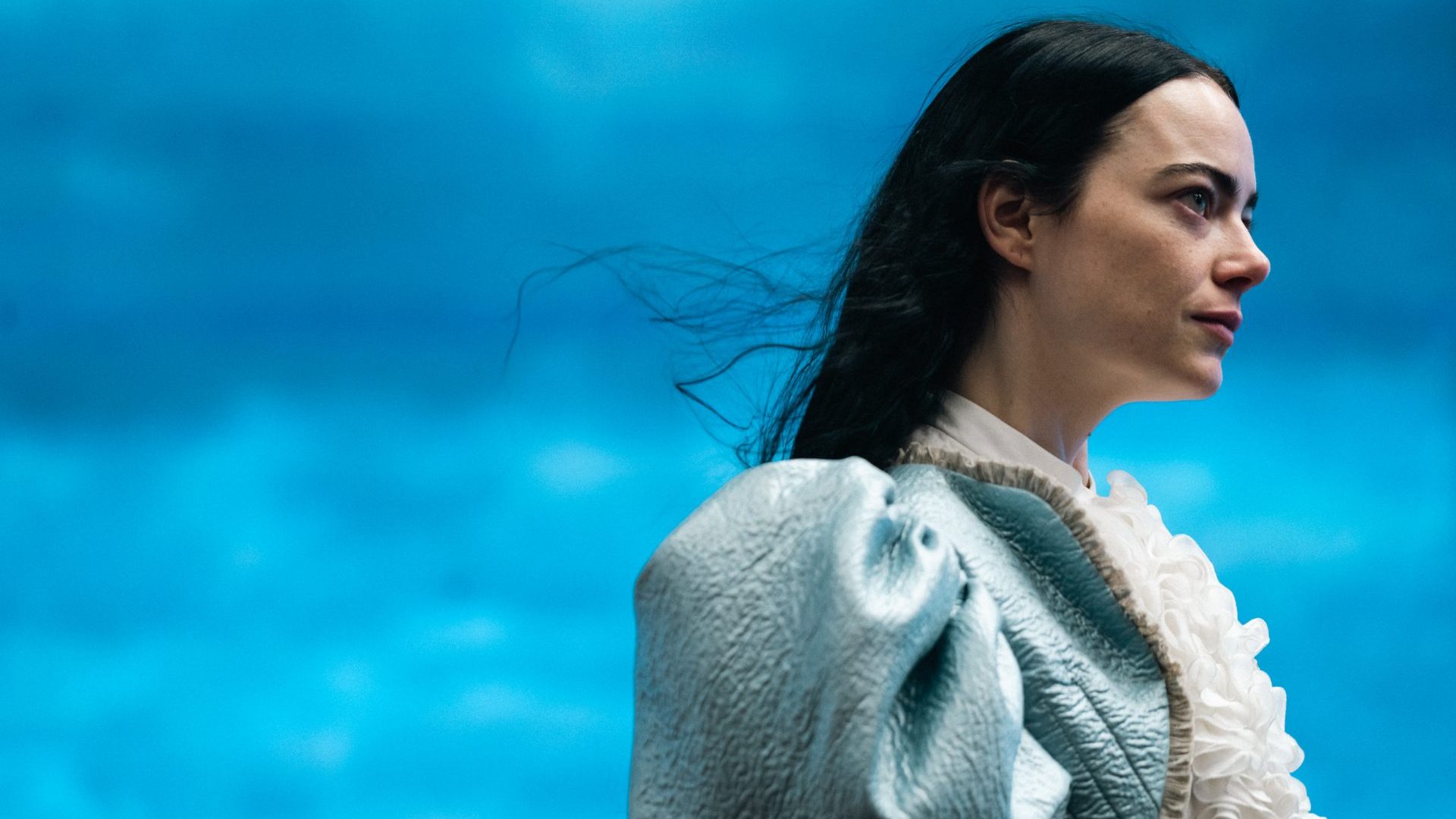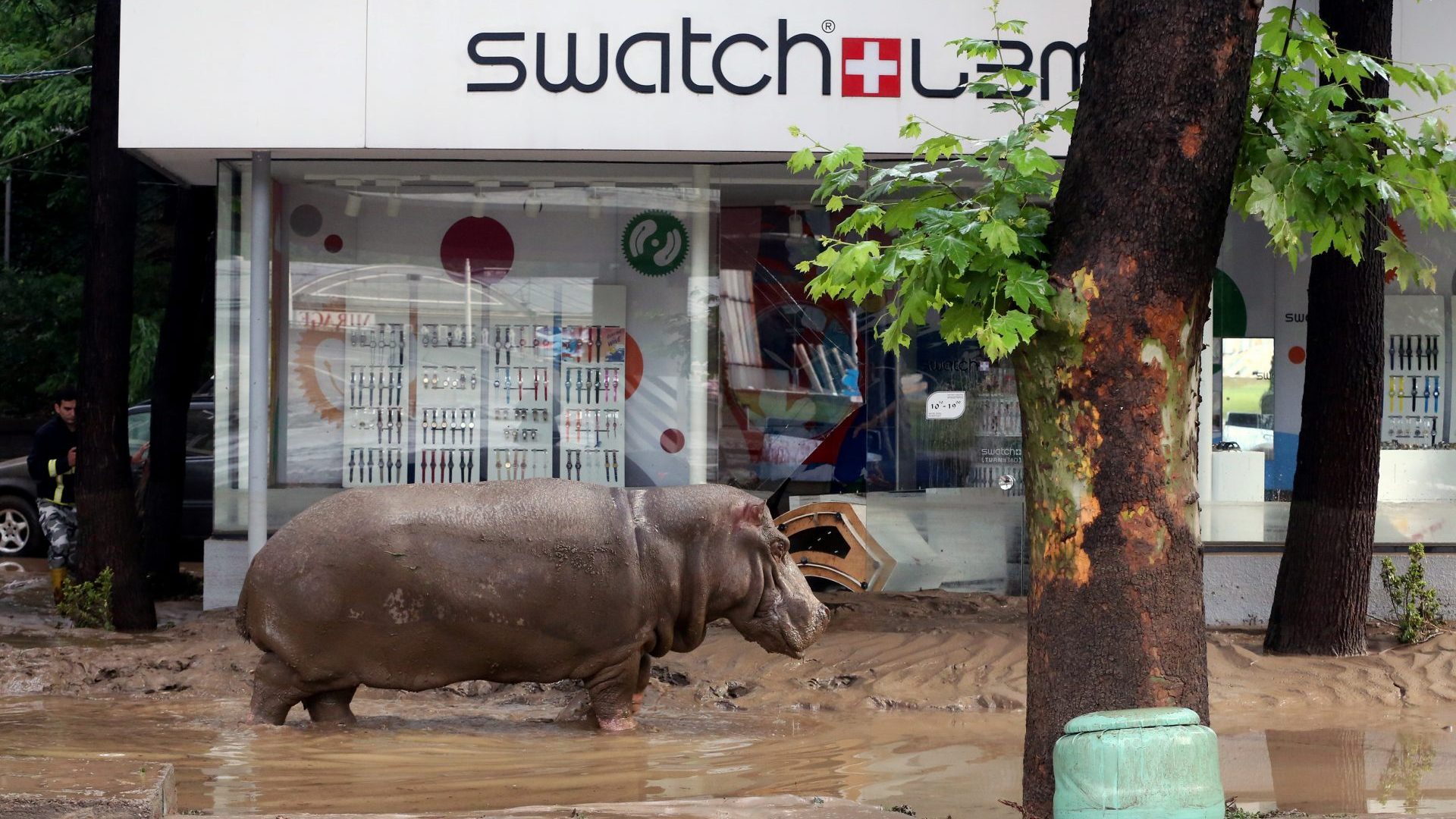More surreal than Barbie, more visually sumptuous than Oppenheimer. No wonder Poor Things is muscling in between those box-office juggernauts now that awards season has begun in earnest.
Already winner of the Golden Lion at Venice last September, this absurd, sexy and unique-looking outsider scored an upset victory over Greta Gerwig’s subversive blockbuster in the “comedy or musical” category at last weekend’s Golden Globes and looks set fair for an impressive haul at the imminent Oscar nominations.
The latest collaboration between surreal Greek director Yorgos Lanthimos and his now-regular star Emma Stone, Poor Things was long-listed in 14 categories for the Baftas last week. And while it boasts (somewhat controversially, but more of that later) British credentials in being adapted from a novel by Glasgow author Alasdair Gray, it was, however, almost entirely shot on some fantastically designed sets in two Budapest studios that created colliding, impossible-looking worlds of British Victoriana, European Belle Époque and Art Nouveau representing London, Lisbon, Alexandria and Paris.
The film’s award buzz comes from its look, as well as Stone’s Golden Globe-winning performance, which is its heart. Perhaps what is most worth noting though is that for all its critical success and awards clout, Poor Things is a mighty weird film to be cutting a swathe through the mainstream. But then, so was last year’s awards champion Everything Everywhere All At Once, demonstrating that the traditional feelgood Oscar winner has been well and truly consigned to the Weinstein dungeon (although there’s always a Green Book or a CODA-shaped surprise lurking.)
While Lanthimos burst on to the international film scene at the crest of the Greek “Weird Wave” with Dogtooth, he has slowly cemented his credentials as a leading film artist with English-language films that are nevertheless just slightly off-centre, or out of kilter, or arch, or plain bizarre: unromantic comedy The Lobster, the icy psychological horror The Killing of a Sacred Deer (which won Best Screenplay at Cannes in 2017) and dark period romp The Favourite, for which Olivia Colman’s performance as Queen Anne so memorably won an Oscar in 2019.
Poor Things has already furthered his reputation for daring, bold, experimental movies that provoke and push audiences, as well as stretching all participants in a Yorgos Lanthimos world.
“I want it to look like nothing has ever looked before,” was his mantra for the design of the film, which has certainly resulted in the most singular-looking movie of the year – although in the awards races, it is perhaps a misfortune to be coming up against the poppy brightness of Barbie in so many categories, not least in the fields of lead actress, and costume and production design.
Indeed, the two films, it strikes me, are not dissimilar. Both deal with the comic, emotional journey of a female protagonist who is learning to become human. In Barbie, it is Margot Robbie’s famous blonde doll who leaves a fantasy world to discover life – and sexuality – in the real world; in Poor Things, Stone plays Bella Baxter: literally a creation, reanimated Frankenstein-like by implanting an infant’s brain into a dead young woman’s body.
Bella is some sort of deranged experiment by her mad scientist father Dr Godwin Baxter (played by Willem Dafoe with a dodgy Scottish accent and a patchwork face). Starting as a baby in an adult – and very attractive – body, she therefore walks doll-like through her new life, with often comical results. But she’s also very quickly waking up to a new world and, launched on an accelerated journey of growing up, she discovers all its possibilities and pleasures, many of them sexual.
Bella runs off to Lisbon with lover Duncan Wedderburn, played by Mark Ruffalo with such pantomime caddishness that he might well be channelling Terry Thomas. There she develops an insatiable appetite for custard tarts – who can blame her? – as well as sex; then she’s on an ocean liner to Alexandria (watch out for German legend Hannah Schygulla) before ending up in a Parisian brothel and then returning to London as a fully formed, sexually and intellectually liberated woman.
It’s a challenging journey for all: for Stone, this requires an extraordinary physical performance, which she delivers with impressive depth and timing. The audience is required to make leaps of faith and tone and to be confronted with moral questions. I often felt unsure about the exploitative nature of the subject, doubting the comic or satirical value of watching Stone’s Bella having sex while clearly still a child – in her mind, at least – and repeated scenes of her being physically and mentally abused, even if she does come out intact and on top.
Of course, it’s all an exaggerated examination of the time and of female categorisation, marginalisation and suffering, and the film is saying it all still happens now, I get all that. And this film gets away with it, just about. Despite the film receiving an 18 certificate, the UK censors, it emerged last week, insisted on a small cut to a scene in the Paris brothel in which Bella is enlisted to teach sex to a client’s children – a scene in contravention of the 1978 Protection of Children Act.
Poor Things is much aided in its air of magic surrealism by the designs, of costume and production, which feed into the characters and tilt their world on an axis to match their stilted dialogue, as written by Australian Tony McNamara, who co-wrote The Favourite and whose florid style is evident in his recent TV series The Great.
For me, aside from Stone’s intelligent and committed performance, the design is the film’s triumph. Typically thinking outside the box, Lanthimos employed two production designers to work in tandem, the experienced James Price (Paddington 2, The Nest) and Shona Heath, whose background is more in art and photography having worked with artists such as Tim Walker and on high-end fashion shoots for Dior and Prada. The combination is breathtaking.
You’ll spend much time gawping at the screen, ingesting influences as wide-ranging but clearly present as Bosch’s The Garden of Earthly Delights, Egon Schiele, Powell and Pressberger’s Black Narcissus and Francis Ford Coppola’s film of Bram Stoker’s Dracula.
While you wonder at some of the intricacies involved, the sets are all constructed using two of Budapest’s large sound studios (Hungary is now one of Europe’s most used locations, housing the worlds of Denis Villeneuve’s Dune films, for example), Origo Studios and Korda Studios. The Lisbon set was the largest, taking 22 weeks to build; London took 16 weeks and Paris eight weeks.
The London set, for example, contained the Baxter house, with its precarious staircase and atrium, all reflective of Bella’s and the doctor’s states of mind. Bella’s room is padded to contain her toddler-like energy and the floor is like a mattress made of soft sponge.
Heath has cited French illustrator Albert Robida as an influence. “He was a futurist in the Victorian age,” she has said. “We ground ourselves in that era but as if it was a parallel universe, a base that we could explode and mess up. We put in electricity and plastics when those materials weren’t even invented yet.”
After Sandy Powell’s Oscar nomination for the costumes on The Favourite, this time Lanthimos opted for a less established talent in Holly Waddington, who has worked on Lady Macbeth with Florence Pugh and whom writer McNamara recommended after her creation for his TV show The Great.
She chose a melange of period details, including Japanese dolls of the era and exaggerated big puffy sleeves for all Bella’s outfits. “Because Bella is unique, we didn’t want to dress her ‘correctly’ for the period,” Waddington has stated. “It looks like she has pulled her clothes out of a dressing-up box, as a child would, but it all works as a language, and marks her out as modern.”
The film has stirred up some controversy in Glasgow, setting of the original book and beloved city of its author, Gray. Lanthimos travelled there to meet Gray back in 2011 and the writer led him on a tour of the city.
There have been complaints that Glasgow has all but been airbrushed out of the picture, replaced by a London skyline. Lanthimos has admitted that, as a Greek but a long-time resident of north London, he was the wrong person to make a film about Scotland – “it would have been disingenuous,” he has said – so he avoided it to concentrate on what he saw as the “universal and elemental aspects of the story”.
This has, however, prompted some backlash from Scottish cultural protectors. There’s a documentary now on YouTube called The Poor Things Problem, highlighting what they see as a betrayal of Gray’s novel. According to Ossian Scotland film-makers Gavin Lundy and Jack O’Neill, it’s like taking Joyce out of Dublin, Dickens out of London or Amy Tan out of San Francisco.
But, if not directly benefiting Scotland, can Lanthimos’s success have much knock-on effect in his native Greece? If his rise was on the crest of a new wave, it has so far merely rippled ashore, with Christos Nikou’s festival-circuit hit black comedy Apples carrying into the international release of his film Fingernails, starring Jessie Buckley and Riz Ahmed.
Recovering from years of financial austerity and EU bailout, there is a hope, however, that Lanthimos’s style and success can still inspire confidence in a new generation of Greek film-makers, such as Araceli Lemos, whose 2021 debut Holy Emy was awarded in Locarno; Evi Kalogiropoulou, whose short film On Xerxes’ Throne won a prize at Cannes’s Critics Week; and Vasilis Kekatos, whose The Distance Between Us and the Sky took home the short film Palme d’Or.
With tax breaks and government encouragement Greece, meanwhile, has become a favourable location for international European co-productions, housing major projects such as Ruben Östlund’s Cannes winner Triangle of Sadness, Rian Johnson’s Knives Out sequel Glass Onion and smaller UK-led projects including Hot Milk, adapted from the Deborah Levy novel and starring Emma Mackey, Vicky Krieps and Fiona Shaw; and Uberto Pasolini’s Odyssey-based film The Return, starring Ralph Fiennes and Juliette Binoche (together again for the first time on screen since The English Patient).
And before Poor Things, Lanthimos and Stone had paid something back to the Greek industry, shooting a silent short film called Bleat on the island of Tinos in the summer of 2020. Since then, they have re-teamed for a US-set film called Kind of Kindness, featuring five interconnected storylines, which I’m sure will be a much-anticipated event at either Cannes or Venice in 2024.
For now, we have a long awards season for Poor Things and the unstoppable force of Bella Baxter, probably the only film with the daring and invention to take on the might of Barbenheimer – and win.
Poor Things is in British cinemas from January 12




